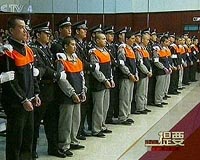| . |  |
. |
Southeast Of Marjah, Afghanistan (AFP) Jan 31, 2010 For the US Marines deployed to the battlefields of southern Afghanistan, life is fragile and thoughts focus on the day they see their families again, but something about this war is different. They are preparing for an offensive on Marjah, one of the Taliban's big urban strongholds in the southern province of Helmand, but progress is slow with the militants apparently preferring fight to flight. The Marines will soon be joined by tens of thousands more soldiers, the lion's share of the 30,000-strong troop surge promised by US President Barack Obama in December to try and turn around the grinding Afghan war. A foot patrol for one platoon of Marines ends with a dash under a hail of bullets across a heavily-mined poppy field. The soldiers have been pinned down in a muddy mound, the thorny weeds cutting through skin. They recover soon enough, however, manoeuvring away from the Taliban's crosshairs and driving them away with heavy machine-gun fire. "I pray in the morning and at night, hoping that someone up there is looking after me," says Lance Corporal Justin Blancas, serving with the Marines 1st Battalion, 6th Regiment Alpha Company's 2nd Platoon. "I have already made my peace with God because this war is different, it's not conventional," the 23-year-old bespectacled Chicago native says. "These Taliban have learned their lesson. They adapt as fast as we do, but we are bound by our strict rules. They are not," he adds, panting after a 100-metre dash for cover behind an abandoned mud house. "It can be a death run like this every day." The US and NATO troop surge is set to swell the foreign force to 150,000 this year, but Afghan and Western officials are also talking about a political solution to end the Taliban-led insurgency as its enters its ninth year. To force the Taliban leadership to the negotiating table however, US military officials have said there needs to be greater success on the battlefield -- and this is where the Marines come in. But the challenges on the ground are immense. Fields are littered with improvised explosive devices (IEDs) responsible for most of the deaths of foreign troops in Afghanistan, which hit a record 520 fatalities last year. The Taliban are also entrenched in their strongholds holding sway over the population and setting up shadow governments across the country, meaning they have the local intelligence that the Marines desperately need. "Marjah has also been a stronghold by the Taliban for some time. They know where we are coming and can stage ambushes anytime," says one sergeant who asks not to be named. Five Marines were killed in southern Afghanistan in two days of January alone in IED blasts and ambushes. Platoon commander Lieutenant David Emison, a Virginia native and the first Marine in his family, still sports a busted lip and chipped teeth sustained from a recent bomb blast that killed a sergeant. "They (the Taliban) make very powerful IEDs out here. If you step on them, you don't get a second chance," says Emison, the group's tactician, whose 25-year-old wife is pregnant with their second child back home. He says that after the incident, he has tried to become more careful about where he treads, but knows that a blast could take any of them anytime. The ex-college wrestler pushes away ugly thoughts and believes the unpopular war Obama inherited from the past administration will have a positive outcome. "It does not pay to be scared," he says. Blancas, meanwhile, arms himself with his assault rifle, two rosaries and prayer cards stuffed in his pockets as the Marines prepare a full-on assault on Marjah in the coming weeks or months. Marjah has a population of at least 60,000. Built in the 1950s with US government help, it was intended to be a model agricultural town with an irrigation system flowing from the Helmand river. But instead of legitimate crops, poor farmers plant opium poppy, the trafficking and sale of which bankrolls the Taliban movement. The Marines' mission is to show US strength, assist in installing government control in Helmand province and let the local population know they have arrived. The challenge however is huge. Taliban militants harass the villagers at night, warning them of trouble if they help US troops. Under the cover of darkness, they also plant IEDs in fields the Marines have to cross. For father-of-one Blancas, it all comes down to one simple thing. "We do what we have to do, but I plan to be out of the corps soon and be daddy. I just have to stay alive till then."
Share This Article With Planet Earth
Related Links News From Across The Stans
 US seeks China transparency in Xinjiang trials
US seeks China transparency in Xinjiang trialsWashington (AFP) Jan 28, 2010 The United States on Thursday urged China to be more transparent in its trials in the Xinjiang region as courts handed down more death sentences over last year's deadly ethnic unrest. The State Department voiced disappointment that China did not agree to US requests to observe the court proceedings. "We continue to urge China to handle their detention and judicial processes in a more tra ... read more |
|
| The content herein, unless otherwise known to be public domain, are Copyright 1995-2010 - SpaceDaily. AFP and UPI Wire Stories are copyright Agence France-Presse and United Press International. ESA Portal Reports are copyright European Space Agency. All NASA sourced material is public domain. Additional copyrights may apply in whole or part to other bona fide parties. Advertising does not imply endorsement,agreement or approval of any opinions, statements or information provided by SpaceDaily on any Web page published or hosted by SpaceDaily. Privacy Statement |